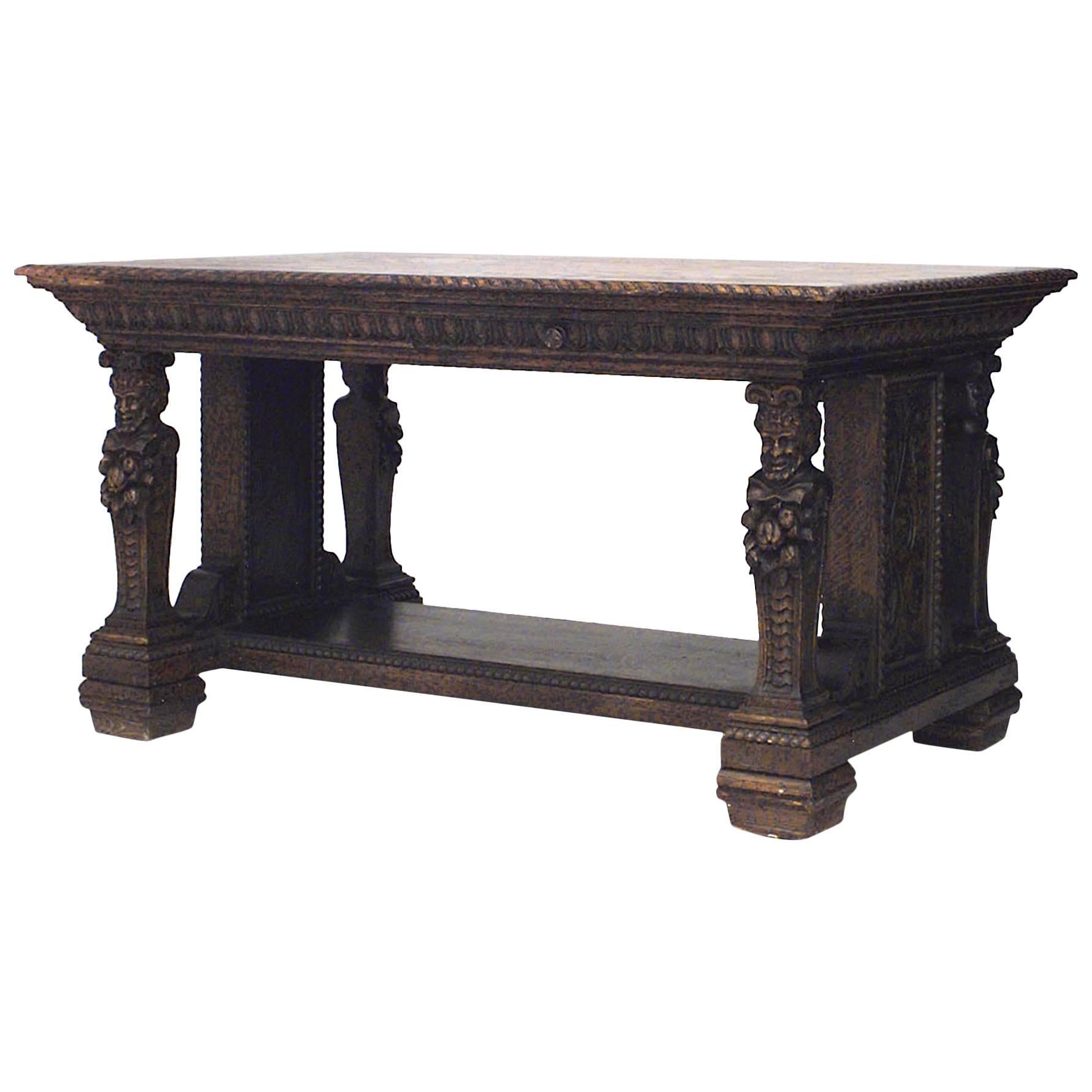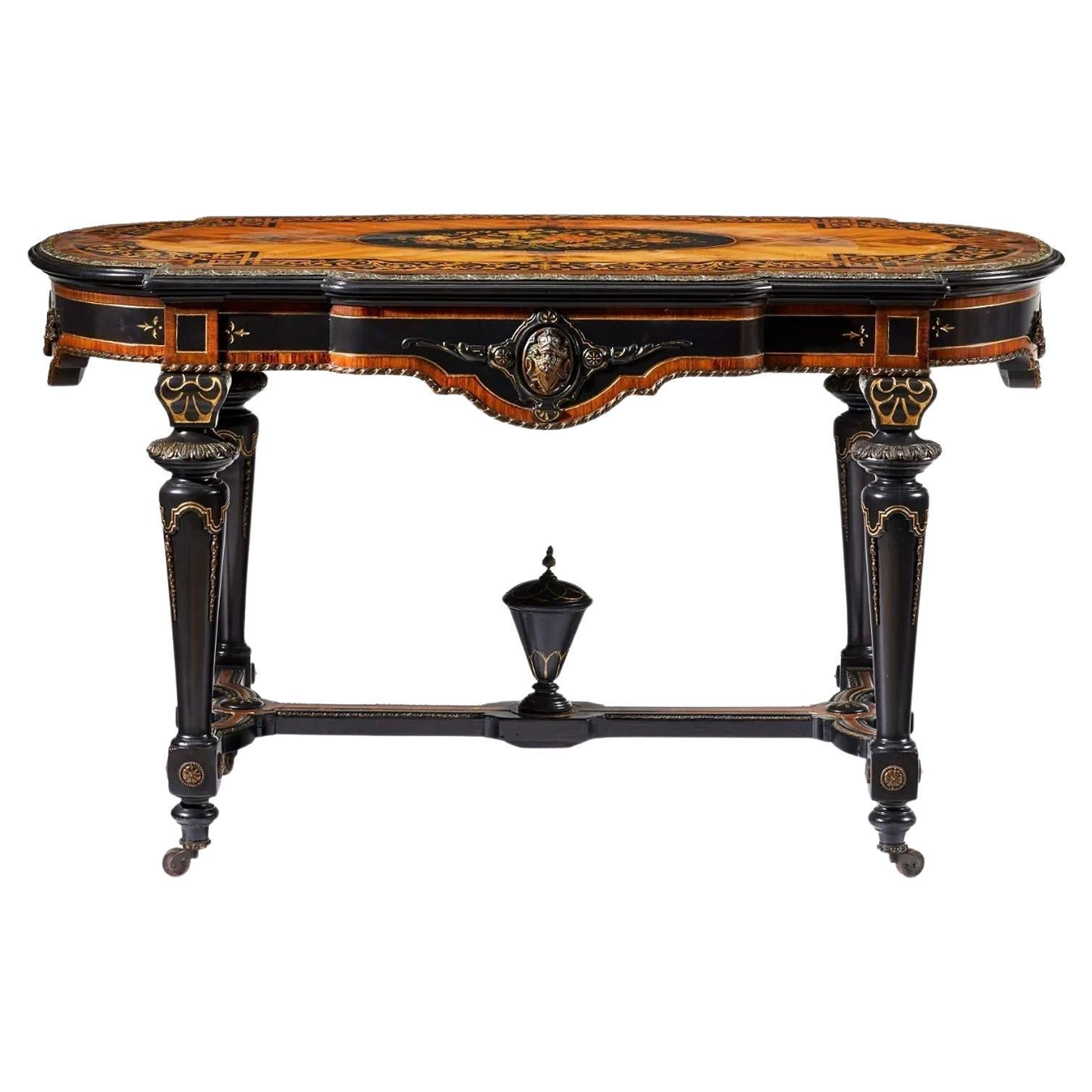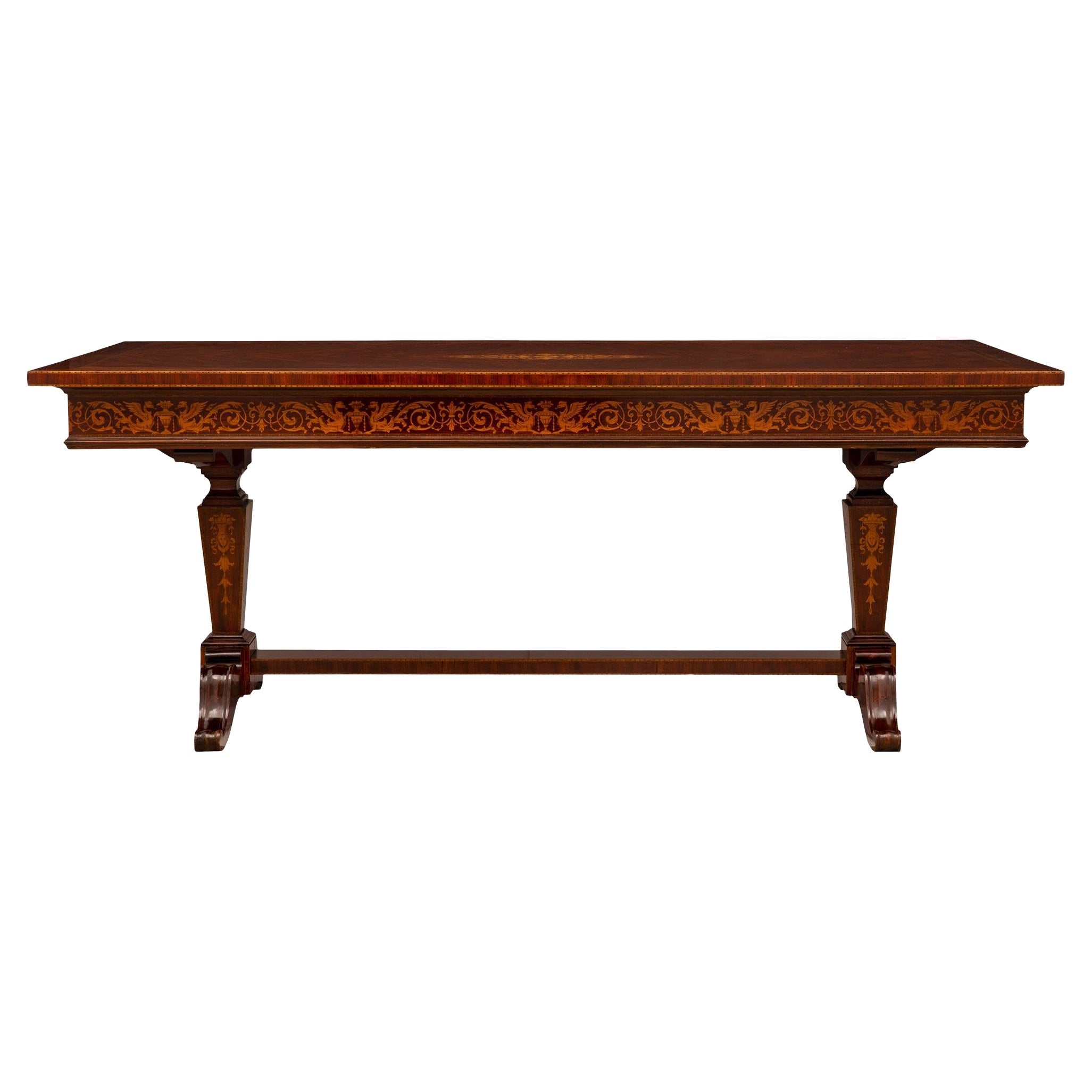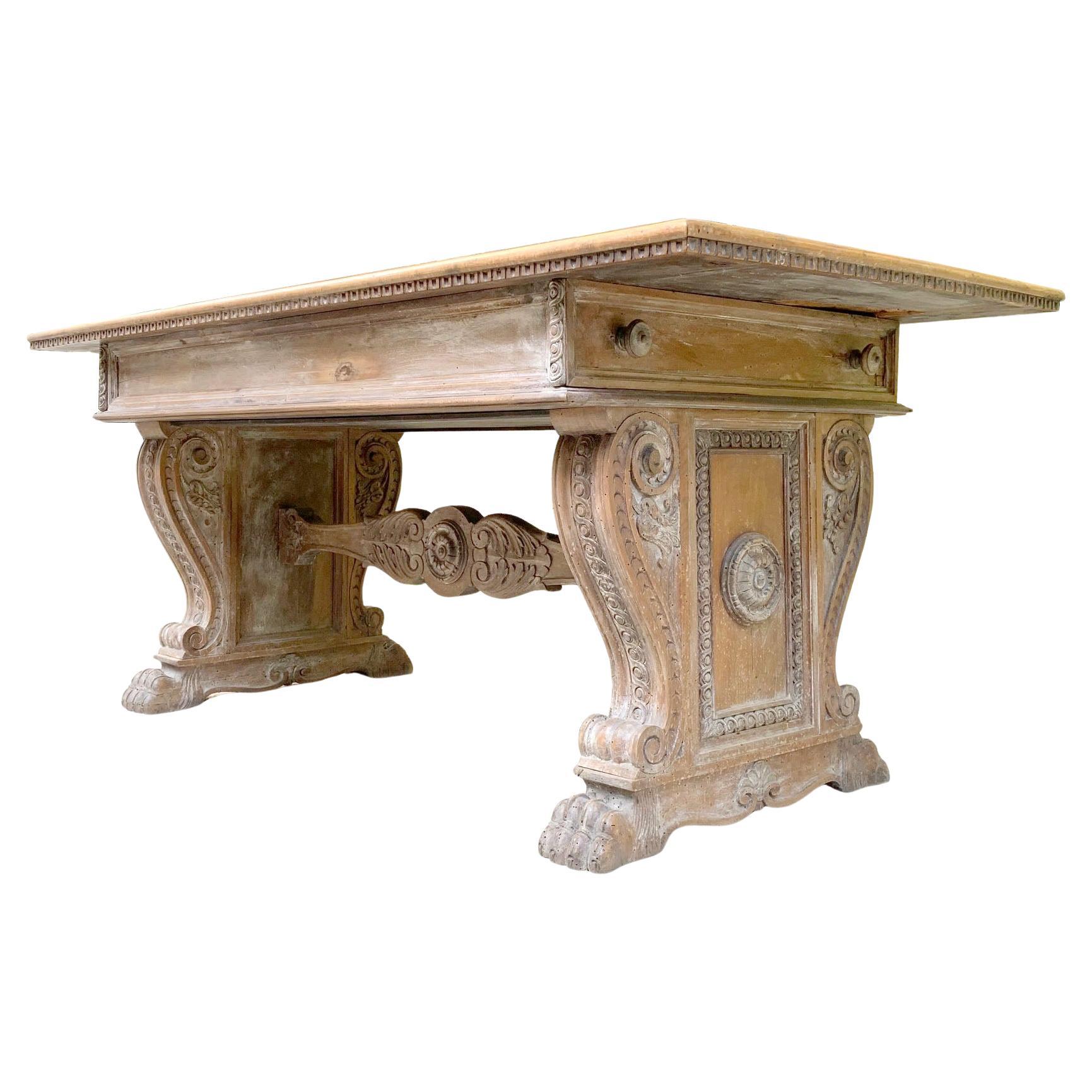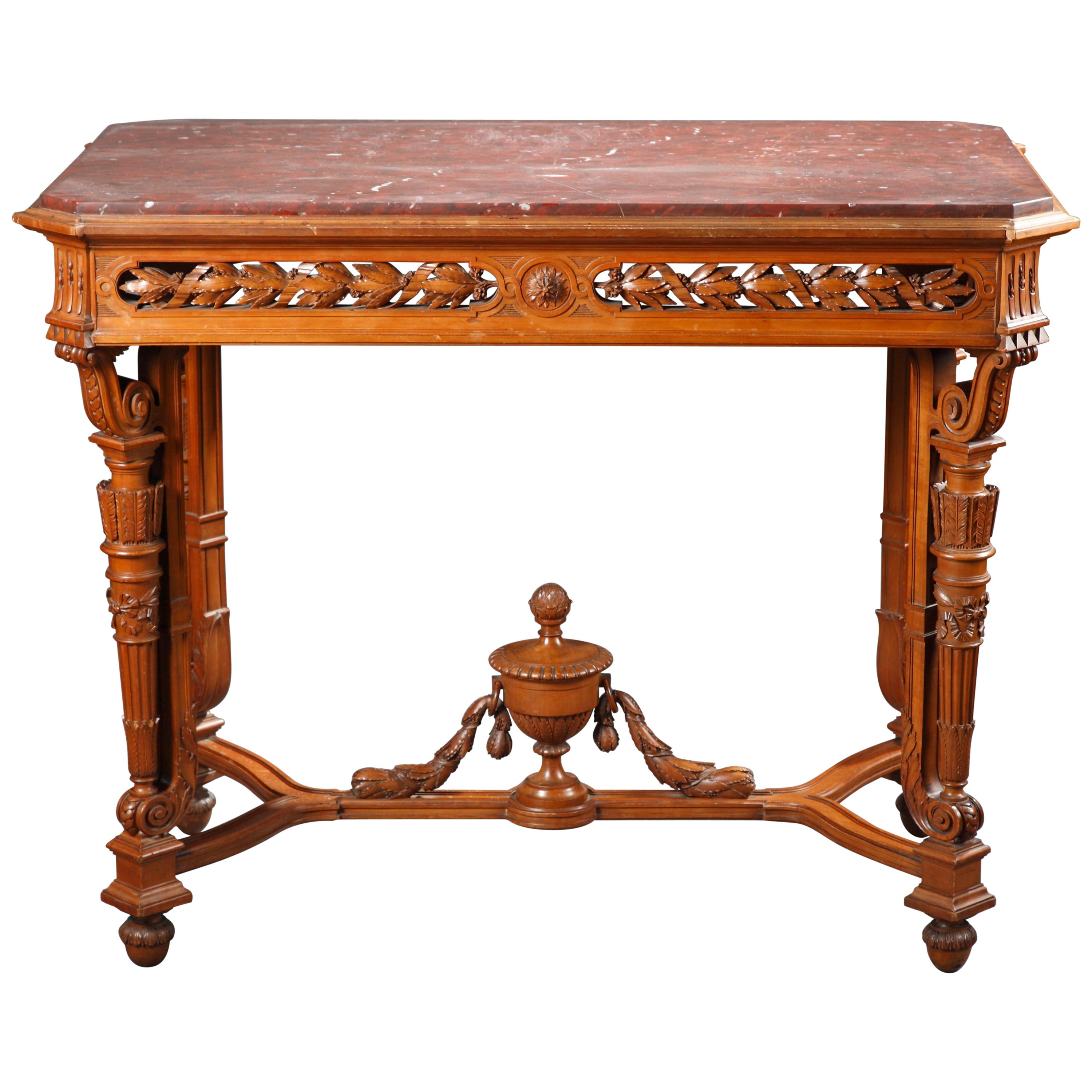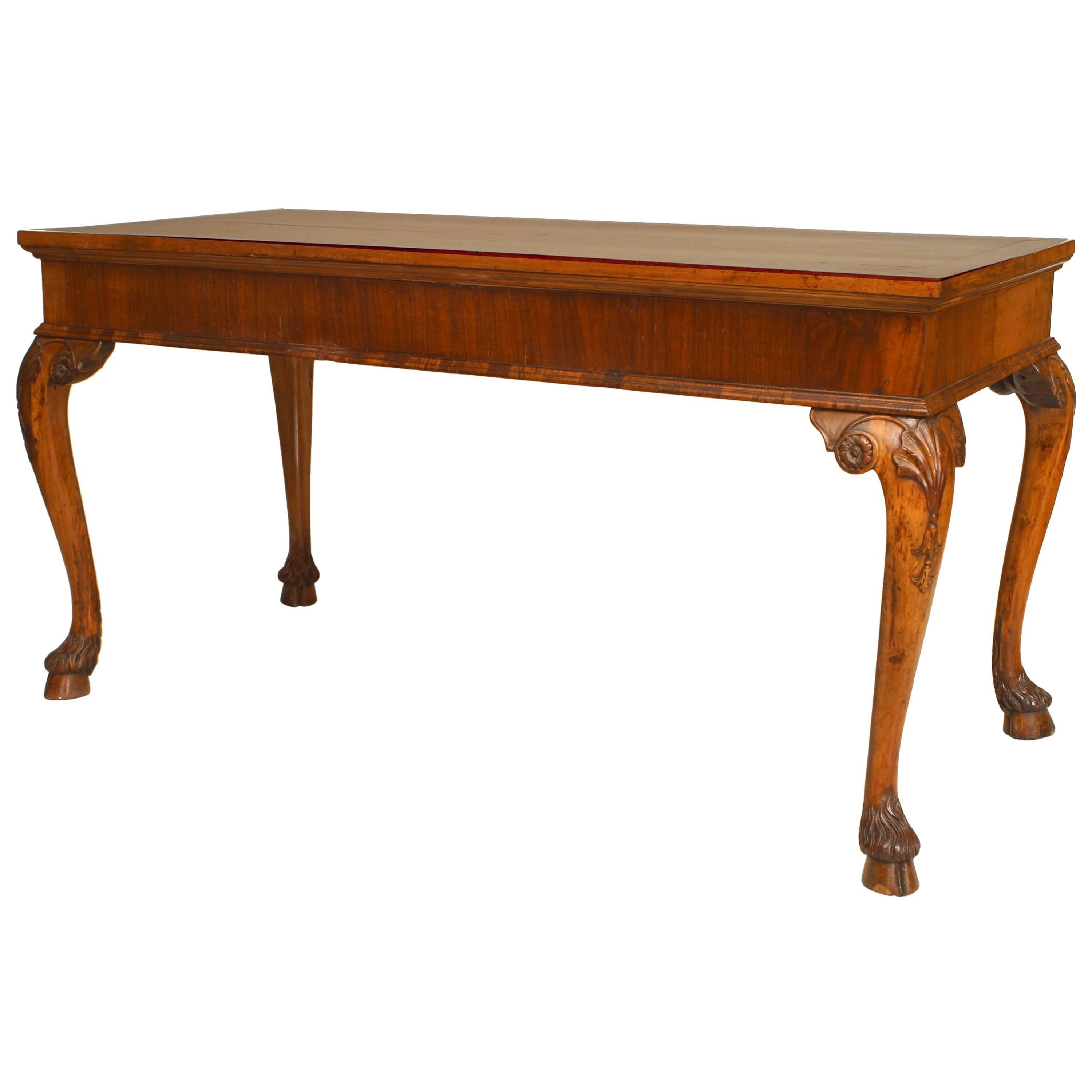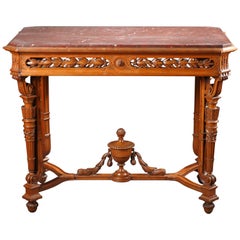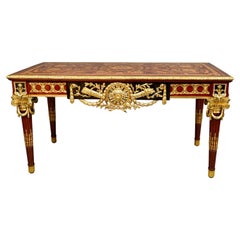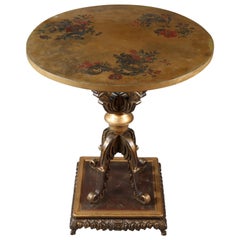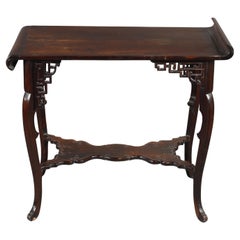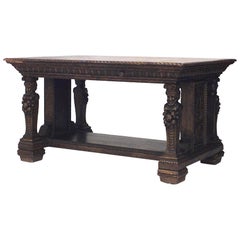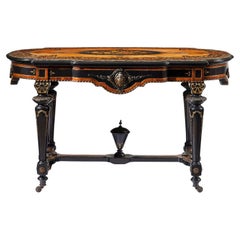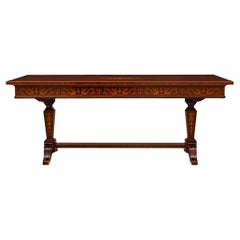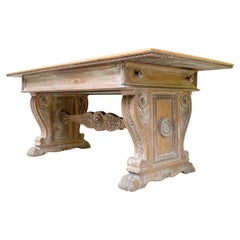Items Similar to Renaissance Style Center Table by Cortina D'Ampezzo, Italy, Circa 1890
Want more images or videos?
Request additional images or videos from the seller
1 of 7
Renaissance Style Center Table by Cortina D'Ampezzo, Italy, Circa 1890
$13,805.88
$28,563.8951% Off
£10,272.13
£21,252.6851% Off
€11,600
€24,00051% Off
CA$19,341.89
CA$40,017.7051% Off
A$21,227.54
A$43,919.0451% Off
CHF 10,947.64
CHF 22,650.2851% Off
MX$253,578.26
MX$524,644.6751% Off
NOK 138,726.87
NOK 287,021.1251% Off
SEK 129,993.54
SEK 268,952.1451% Off
DKK 88,362.78
DKK 182,819.5551% Off
About the Item
Label mentioning “I.R. Scuola, Sezione Intarsio e Intaglio, Cortina d’Ampezzo, n°146”
Exceptional Venetian Renaissance style center table. The top and the frieze opening with four drawers are fully ornamented with a flat carved decoration and a floral and geometric inlay according to the technique of Tarkashi. It rests on four architected legs joined by a stretcher.
Don Cipriano Pescosta (1815-1889) created in October 1846 in the small town of Cortina d’Ampezzo, Veneto, a school for the teaching of drawing. The institution was gradually gaining wide popularity for its courses in sculpture as well as in cabinet making. In 1874, the school became “State Industrial School” and in September 1876, they opened sections of wood inlay and mosaic. In 1881, John Coddington, President of the famous Oriental Club in London, which included British nobles and other gentlemen residing in Asia, made known to the Italian School a new technique, the Tarkashi, thanks to some objects brought from a trip to India. It was a technique of marquetry employing refined interlaced ribbons of various woods and sometimes decorated with ivory and mother of pearl. Artists and students of the Ampezzo art school, already skilled at woodworking, adopted this technique, which was successfully developped and even brought the fame to Cortina d’Ampezzo. In 1889, the school was open to women with sections of sewing, embroidery and lace. Cortina d’Ampezzo School was awarded a silver medal in 1893 at the Regional Exhibition of Innsbruck in Austria. They then sold all of the exhibited pieces, including a large part to the German Darmstadt and Stuttgart museums.
- Creator:Applied Arts School of Cortina d'Ampezzo (Maker)
- Dimensions:Height: 30.32 in (77 cm)Width: 40.16 in (102 cm)Depth: 24.41 in (62 cm)
- Style:Renaissance (In the Style Of)
- Materials and Techniques:
- Place of Origin:
- Period:
- Date of Manufacture:circa 1890
- Condition:Wear consistent with age and use.
- Seller Location:PARIS, FR
- Reference Number:Seller: 4991stDibs: LU3860313627012
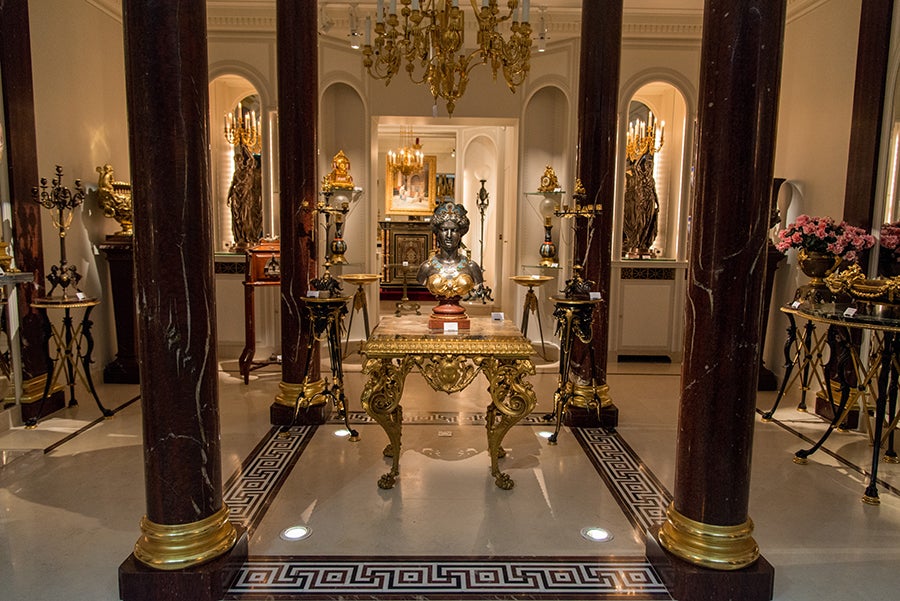
About the Seller
4.9
Gold Seller
Premium sellers maintaining a 4.3+ rating and 24-hour response times
Established in 1997
1stDibs seller since 2018
90 sales on 1stDibs
Typical response time: <1 hour
Associations
International Confederation of Art and Antique Dealers' Associations
- ShippingRetrieving quote...Shipping from: Saint Ouen, France
- Return Policy
Authenticity Guarantee
In the unlikely event there’s an issue with an item’s authenticity, contact us within 1 year for a full refund. DetailsMoney-Back Guarantee
If your item is not as described, is damaged in transit, or does not arrive, contact us within 7 days for a full refund. Details24-Hour Cancellation
You have a 24-hour grace period in which to reconsider your purchase, with no questions asked.Vetted Professional Sellers
Our world-class sellers must adhere to strict standards for service and quality, maintaining the integrity of our listings.Price-Match Guarantee
If you find that a seller listed the same item for a lower price elsewhere, we’ll match it.Trusted Global Delivery
Our best-in-class carrier network provides specialized shipping options worldwide, including custom delivery.More From This Seller
View AllRare Center Table Attributed to A.E. Beurdeley, France, Circa 1880
By Alfred Emmanuel Louis Beurdeley
Located in PARIS, FR
Center table made exclusively in richly carved wood and attributed to A.E. Beurdeley ; with a fine pierced belt ornamented with laurel branches. Raised on four legs joined by a stret...
Category
Antique 1880s French Tables
Materials
Griotte Marble
$13,805 Sale Price
37% Off
Spectacular Louis XVI Style Center Table, France, circa 1880
Located in PARIS, FR
Beautiful ceremonial table in mahogany veneer, black stained wood and gilded bronze. The top with symmetrical decoration presents an important marquet...
Category
Antique 1880s French Neoclassical Tables
Materials
Bronze
Aesthetic Movement Gueridon, England, Circa 1860
Located in PARIS, FR
A Japanese style lacquered table consisting of a circular top adorned with a gold nuagé lacquered decor and with red exotic flowers and scrolled foliage. The top is supported by four...
Category
Antique 1860s English Aesthetic Movement Gueridon
Materials
Lacquer
"Pagoda" table, Attributed to G. Viardot, France, Circa 1880
By Gabriel Viardot
Located in PARIS, FR
Charming Japanese-inspired « pagoda » table in tinted and carved wood attributed to G. Viardot. The rectangular top rests on four slightly curved legs adorned with openwork and sculpted geometric interlacing, joined by an engraved stretcher with a stylized cutout.
Gabriel Viardot career began as a wood carver and he produced small furniture, sculpturally carved with naturalistic motifs and animals. In the 1855 Universal Exhibition in Paris, his finely sculpted objects were well received. However, with the increasing importation of similarly produced Swiss and German articles, he found less opportunity for these and decided to innovate. G. Viardot succeeded to his father's business in 1861 installed rue Rambuteau in Paris. Around 1870 he turned to the idea of producing « Meubles genre Chinois et Japonais ». The taste in Europe for exotic furniture, incorporating sometimes authentic Chinese or Japanese objects...
Category
Antique 1880s French Japonisme Tables
Materials
Wood
Neo-Greek Gueridon Attributed to F. Barbedienne, France, Circa 1880
By Louis-Constant Sevin, Ferdinand Barbedienne
Located in PARIS, FR
A similar model was exposed at the 1889 Paris Universal Exhibition ( see picture attached)
Patinated and gilded bronze gueridon with four paw feet joined by X-shaped stems, attributed to Sévin and Barbedienne. Round green marble top mounted with a bronze rim adorned with oves and pearls motif.
Born in 1821 and dead in Paris in 1888, Louis-Constant Sévin was apprenticed to the parisian sculptor Marneuf. In 1839, he joined the sculptor-modelors Phénix and Joyau, as designer, and designed silver-smith’s objects for famous firms like Denière, Froment-Meurice, Morel and Duponchel. During the Revolution in 1848, C. Sévin joined Morel in London, as workshop manager and designed pieces that Morel exhibited in 1851. Back in France in 1851, C. Sévin went to Limoges and designed models for the porcelain factories of Jouhanneaud and Dubois of which many pieces were exhibited at the Universal Exhibition in 1855. From this date on, he worked for Ferdinand Barbedienne as sculptor-ornemanist until the end of his life. Sévin’s works are considerable, he designed furniture bronzes for the « hôtel de La Païva ». At the London Exhibition in 1862, he was awarded a medal « pour l’excellence artistique des meubles qu’il a dessinés et qui sont exposés par Barbedienne » : for the artistic excellence of the furniture he designed and which is exhibited by F. Barbedienne. He won a second class medal at the Union centrale des Arts décoratifs Exhibition in 1863 and was awarded a gold medal as « cooperator ». F. Barbedienne said that posterity would remember Sévin’s compositions. The most extraordinary object designed by C. Sévin for F. Barbedienne, was a Renaissance style gilded bronze monumental clock...
Category
Antique 1880s French Greek Revival Center Tables
Materials
Marble, Bronze
"Japonisme" Writing-Table by G. Viardot, France, circa 1880
By Gabriel Viardot
Located in PARIS, FR
Beautiful "Japonisme" writing table opening with a belt drawer with engraved decoration of bamboo and flowers and decorated with openwork leafy friezes in bronze, forming a writing tablet covered in velvet.
It rests on four feet mounted at the corners of lion masks in gilded bronze and joined by an openwork spacer, and ending in lion paws. It is topped with a molded Griotte marble.
Biography :
Gabriel Viardot (1830-1906) career began as a wood carver and he produced small furniture, sculpturally carved with naturalistic motifs and animals. In the 1855 Exposition Universelle in Paris, his finely sculpted objects were well received. However, with the increasing importation of similarly produced Swiss and German articles, he found less opportunity for these and decided to inovate. G. Viardot succeded to his father’s business in 1861 installed rue Rambuteau in Paris. Around 1870 he turned to the idea of producing « Meubles genre Chinois et Japonais ». The taste in Europe for exotic furniture...
Category
Antique 1880s French Japonisme Desks and Writing Tables
Materials
Griotte Marble, Bronze
You May Also Like
Italian Renaissance Style (19th Century) Library Style Table Desk
Located in Queens, NY
Italian Renaissance style (19th century) oak library style table desk with carved heads on legs and wide stretcher with one drawer on front and back.
Category
Antique 19th Century Italian Renaissance Revival Desks and Writing Tables
Materials
Oak
Italian Renaissance Revival Library Table
Located in Los Angeles, CA
Italian Renaissance Revival Library table, Mid/late 19th century
In satinwood, burl, ebony, and other timber with marquetry veneer...
Category
Antique Late 19th Century Italian Renaissance Desks and Writing Tables
Materials
Ebony, Satinwood, Burl
Italian Mid 19th Century Neo-Classical St. Mahogany and Tulipwood Center Table
Located in West Palm Beach, FL
A handsome Italian mid 19th century neo-classical st. mahogany and Tulipwood center table. The rectangular table is raised by handsome square tapered supports with beautiful inlaid f...
Category
Antique 19th Century Italian Neoclassical Center Tables
Materials
Mahogany, Tulipwood
Magnificent 18th-century Italian Renaissance-style table
Located in Rio De Janeiro, BR
This magnificent 18th-century Italian Renaissance-style table, crafted from walnut, was designed to serve both as a library and dining table. A rare and imposing piece, it embodies t...
Category
Antique Mid-18th Century Italian Renaissance Revival Dining Room Tables
Materials
Wood
Italian Venetian 19th Century Center Table
Located in Queens, NY
Italian Venetian (19th Century) rectangular olive wood veneer center table with cabriole legs ending in hoof carved feet.
Category
Antique 19th Century Italian Center Tables
Materials
Wood
A Victorian Walnut Center Library Table / Partners Desk, C. 1885.
Located in Philadelphia, PA
In the Renaissance Revival style, this substantial desk features a shaped, molded top with an inset faux leather writing surface, over two drawers on each side. The piece rests on ca...
Category
Antique Late 19th Century American Renaissance Revival Center Tables
Materials
Faux Leather, Walnut
More Ways To Browse
Pietra Dura Table Antique
Black Lacquered Center Table
Unique Center Table
Trefoil Base
Pietra Table Top
Bronze Lion Feet
French Marquetry Center Tables
Jaime Hayon Explorer
Paw Foot Furniture
Pietra Dura Table Top
Acanthus Pedestal
Carved Lion Table
Empire Round Table
Marquetry Centre Table
Oak Centre Table
Rosewood Centre Table
Sunburst Veneer
Bronze Centre Table
